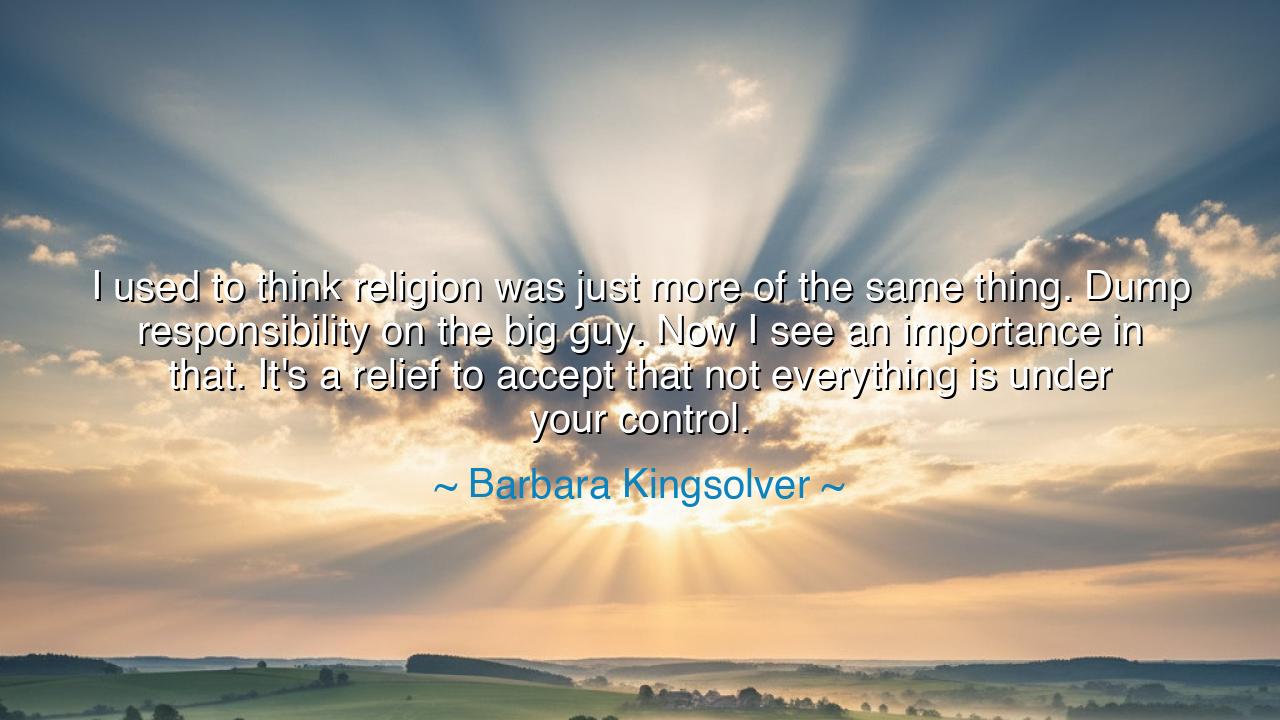
I used to think religion was just more of the same thing. Dump
I used to think religion was just more of the same thing. Dump responsibility on the big guy. Now I see an importance in that. It's a relief to accept that not everything is under your control.






"I used to think religion was just more of the same thing. Dump responsibility on the big guy. Now I see an importance in that. It's a relief to accept that not everything is under your control." These words, spoken by Barbara Kingsolver, offer a moment of profound realization—a shift in understanding about faith, responsibility, and the nature of human control. In her reflection, Kingsolver speaks to the age-old tension between the human desire to control every aspect of life and the profound relief found in surrendering certain burdens to a higher power. Her insight touches on the timeless truth that accepting that not everything is under our control can lead to a sense of peace and freedom—a profound liberation from the weight of life’s challenges.
In the ancient world, philosophers and spiritual leaders grappled with this very question: What is the relationship between human effort and the divine will? The Stoics, for instance, believed that we must control what we can—our own thoughts, actions, and responses—while accepting that we cannot control the universe or the actions of others. Epictetus, one of the great Stoic philosophers, taught that “Some things are up to us, and some things are not.” His philosophy was grounded in the idea that peace comes not from trying to control the uncontrollable but from focusing on what is within our power and letting go of the rest. This resonates with Kingsolver’s recognition of the relief that comes with surrendering some responsibility to the divine.
The Buddha also spoke to this idea of letting go. In the ancient teachings of Buddhism, there is a deep recognition that much of human suffering arises from our attachment to the idea of control. The Four Noble Truths teach that desire, especially the desire to control everything around us, leads to suffering. True freedom and enlightenment, according to the Buddha, come from accepting the impermanence of life and relinquishing the need to grasp and control what is outside of our power. The Buddhist path encourages detachment, not as a way of rejecting life, but as a way to live with greater peace and compassion, free from the anxiety of having to control every outcome.
In Christianity, this theme of surrendering to divine will is also central. Jesus Christ, in His prayers, often spoke of surrendering His will to that of God. In the Garden of Gethsemane, just before His crucifixion, He prayed, "Not my will, but Yours be done." This act of surrender—the acceptance of divine will over personal control—was a profound demonstration of faith and trust in something greater than the individual. For Christians, this act of surrender is not a sign of weakness, but a powerful act of trust and submission to a higher, loving force. It shows that peace comes from trusting that there is a purpose beyond what we can see or understand.
In modern times, Viktor Frankl, a Holocaust survivor and psychiatrist, explored the human need to find meaning in the face of suffering and powerlessness. In his work Man’s Search for Meaning, Frankl argues that even in the most unbearable circumstances, when so much is beyond our control, we retain the freedom to choose our attitude toward our suffering. Frankl’s discovery—that we cannot control the external events of life, but we can control our response to them—offers a path to inner peace. His perspective aligns with Kingsolver’s shift in thinking: the relief comes when we accept that not everything is under our control, and that we can find strength and peace in surrendering to life as it unfolds.
The lesson from Kingsolver’s insight is profound: control is often an illusion, and the key to inner peace lies in recognizing what is beyond our grasp and surrendering to it. We can control our own thoughts, actions, and responses, but we cannot control the course of the world or the hearts of others. Acceptance of this fact is not a weakness, but a strength—an ability to live with serenity in a world full of uncertainty. By relinquishing the need to control everything, we create space for grace, trust, and the recognition that there is a divine order or purpose that governs the universe, even if we do not always understand it.
In our own lives, we can take Kingsolver’s words to heart by learning to accept the parts of life that are beyond our control. Let go of the need to force outcomes, to manipulate situations, or to cling to the illusion of complete mastery over our circumstances. Instead, focus on the choices we can make and the attitudes we can cultivate. Just as the Stoics practiced resilience in the face of external chaos, so too can we find freedom by releasing the burdens of control. By doing so, we open ourselves to the peace that comes from trusting in something greater than ourselves, and from embracing life with grace and humility.






AAdministratorAdministrator
Welcome, honored guests. Please leave a comment, we will respond soon